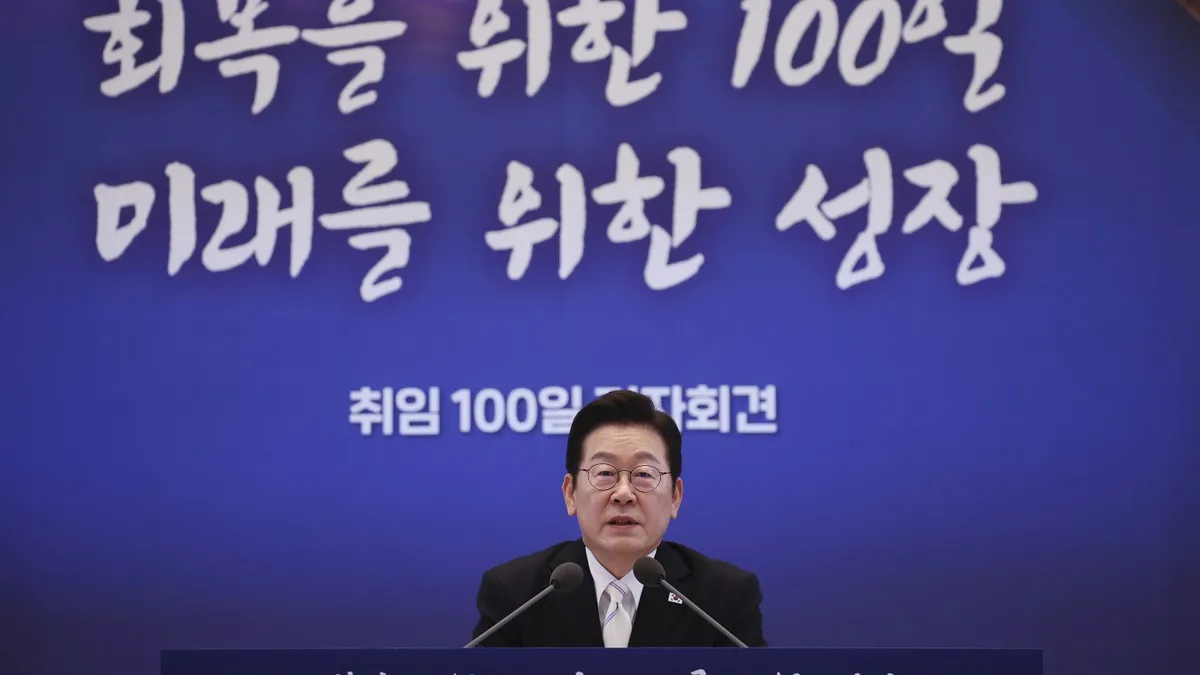
In a recent news conference, South Korean President Lee emphasized that if the United States does not improve its visa system for Korean workers, South Korean companies may be reluctant to maintain or increase their direct investments in the U.S. This statement came as Lee celebrated his 100 days in office and addressed the fallout from a controversial immigration raid in Georgia on September 4th, where over 300 South Korean workers were detained at a battery factory under construction at Hyundai's expansive auto plant.
The immigration raid in Georgia has ignited widespread anger and feelings of betrayal among the South Korean public. Lee revealed that following negotiations with U.S. authorities, the detained workers are scheduled to return home on a charter flight this Friday. The operation, which included video footage of some workers being shackled, drew sharp criticism from lawmakers across the political spectrum in South Korea, who labeled the detentions as heavy-handed and outrageous.
Notably, the raid occurred shortly after President Donald Trump and President Lee met for a summit, and just weeks after the two countries reached an agreement that exempted South Korea from the Trump administration's highest tariffs. This was contingent on South Korea committing to a staggering $350 billion in new investments in the U.S.
During the press conference, President Lee articulated that the current visa system is a significant barrier, causing South Korean companies to hesitate in making substantial investments in the U.S. He stated, "Under the current system, our companies can’t help hesitating a lot," highlighting that many South Korean firms rely on short-term visitor visas or the Electronic System for Travel Authorization to send essential workers for manufacturing setup and other tasks.
Lee pointed out that whether the U.S. develops a visa system that accommodates South Korean skilled workers could have a profound impact on future investments. "It’s not like these are long-term workers. When you build a facility or install equipment at a plant, you need technicians," he explained. "The United States doesn’t have that workforce, yet they won’t issue visas to let our people stay and do the work." He warned that without a resolution, establishing facilities in the U.S. could become increasingly challenging for South Korean firms.
President Lee further reflected on the cultural differences in immigration practices between South Korea and the United States. He noted, "In South Korea, we see Americans coming on tourist visas to teach English at private cram schools — it’s just something you accept." In contrast, he expressed concern that U.S. immigration authorities are aggressively pursuing illegal immigration and employment, which has resulted in the detainment of South Korean workers.
Following discussions with U.S. Secretary of State Marco Rubio, South Korean Foreign Minister Cho Hyun announced that U.S. officials have agreed to allow the detained workers to return and complete their work at the Georgia facility. The two nations also plan to establish a joint working group aimed at creating a new visa category that would simplify the process for South Korean companies to send employees to the U.S.
However, Cho warned that without a resolution to the visa issue, more South Korean workers in the U.S. could face vulnerabilities to future crackdowns, although an estimate of those at risk has yet to be determined.
The Georgia battery plant is just one of over 20 major industrial sites that South Korean companies are currently establishing across the United States, which includes multiple battery factories, a semiconductor plant in Texas, and a shipbuilding project in Philadelphia. Min Jeonghun, a professor at South Korea's National Diplomatic Academy, stressed that it is crucial for the U.S. to address the visa issue, either through legislative action or administrative changes to expand short-term work visas for training purposes.
Underestimating the public outrage in South Korea over the detentions could be a significant mistake, especially considering the backdrop of Lee's government pledging hundreds of billions of dollars into U.S. industrial investments amidst a declining job market at home. Min cautioned that without updates to U.S. visa policies, "Korean companies will no longer be able to send their workers to the United States, causing inevitable delays in the expansion of facilities and other production activities, ultimately harming the U.S. economy."